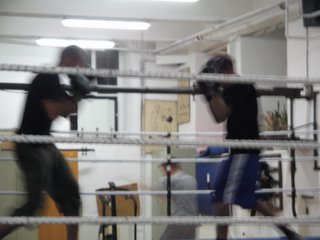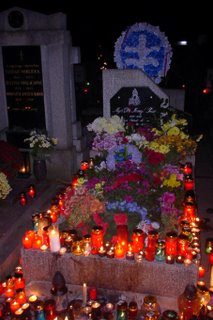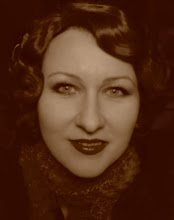
Guys at the Boxzentrum are intriguing. They all come from walks of life I have not even been in vicinity of, so far removed from my reality. They're tough street kids, many are from Serbia, Bosnia, or Albania and their life stories sound like jaw-dropping fairy tales to my pampered, spoiled, over-educated self.
Goran is one of the advanced boxers. When we, beginners, jump back and forth like a sack of potatoes spilt on a staircase, throwing imaginary punches in every which direction but straight, he's up in the ring, sparing with another meister, both glistening with sweat, barking out jugular groans. Or he's punching the daylights out of a heavy bag for what seems like hours. His is the first life story that I want to jot down.
Goran is always serious. Workout is his mass, he trains religiously twice a day except for Sunday. He's always either in the ring or around the bags, that's why I haven't really registered him before today. After the workout today he was hanging at the bar and got me and Magda a drink. Everybody calls him Gogi.
Gogi comes from Serbia. I don't know whether he was there during the war or not, I need to ask him that. His father was a boxer, a European pro champion, as was his grandfather. Gogi has pictures of himself being three years old, punching mittens his dad held up for him. He trained until he was ten. But he was no good for boxing. He was a crybaby, breaking into tears for every hurtful punch or when success was not anywhere in sight. He stopped after that, getting himself into the troubled waters of teenage life. Gogi was on the streets, doing what the tough street kids do on the streets (don't ask me, I wouldn't know). He became a bouncer at a night club, and got mixed into a fight. He knocked a guy out. He knocked him out cold. Gogi got half a year of jail time for that.
Prison was a turnaround point for Gogi. He thought a lot about his father, and about God, with both of whom he parted years ago. He spent hours shadowboxing to keep his body and mind in tune. Shortly before he was released, he made a promise to God. If he can become good in boxing, if he can become the European Champion in professional boxing like his father one day, he will in devote all the rest of his life to helping kids like himself. He will coach young boxers and reach out to street kids and do anything in his power to help out. Gogi has not steered away from this path once.
Goran came back to boxing in 2000. He threw all his time, will, and heart into the sport. His dream is getting more and more palpable, it's looming right above him, just one or two reaches and he's there. Gogi made it through the amateur matches and became the amateur welterweight European Champion in 2004. He started hi pro boxing career this year. He's made it victoriously through six matches already. He has to win the next four as well, otherwise he won't get ranked for the European pro championship. That is not in the plan. There's no alternative scenario, musn't think about that. Next match is in two weeks, another one in January. I sure hope I can report that he won.
Gogi will box for another six years. Not more. He showed me his hands, scarred all over. He cannot straighten his fingers anymore, tendons in his fingers shrunk. There is a barrier up to which you can push yourself. Once you cross it, you'll become a useless wreck. He'll be thirty two in six years. By then he hopes to be rich and get behind the scenes of boxing. If you use your brain, boxing can be a profitable business. But he also wants to be a role model, work with troubled kids.
Gogi sure keeps an eye out for the newcomers at the club. There were two rowdy boys that joined some time ago. Both were orphaned, wreaking havoc on the streets. Johann had to eventually kick them out, as things kept being broken or disappearing. Gogi's mouth-guard went missing once. Sure enough it was found in one of the orphans' pocket. Kid wanted to hang onto something that belonged to Gogi, the champion. Gogi is the God to these two. They come to every single match, no matter how far it is even though they're not training in the club anymore. They do whatever Gogi tells them to do. He will surely be able to do a whole lotta good with his charisma and following. But until then, keep your fingers crossed on November 26. Gogi needs to win. He needs to keep saving himself. The two kids need him to win. They need it to start saving themselves. I'm not religious, but if some of you go to church, can you please tell the Man upstairs next time you're in to keep an eye out for this one? It is really important. Thanks.












